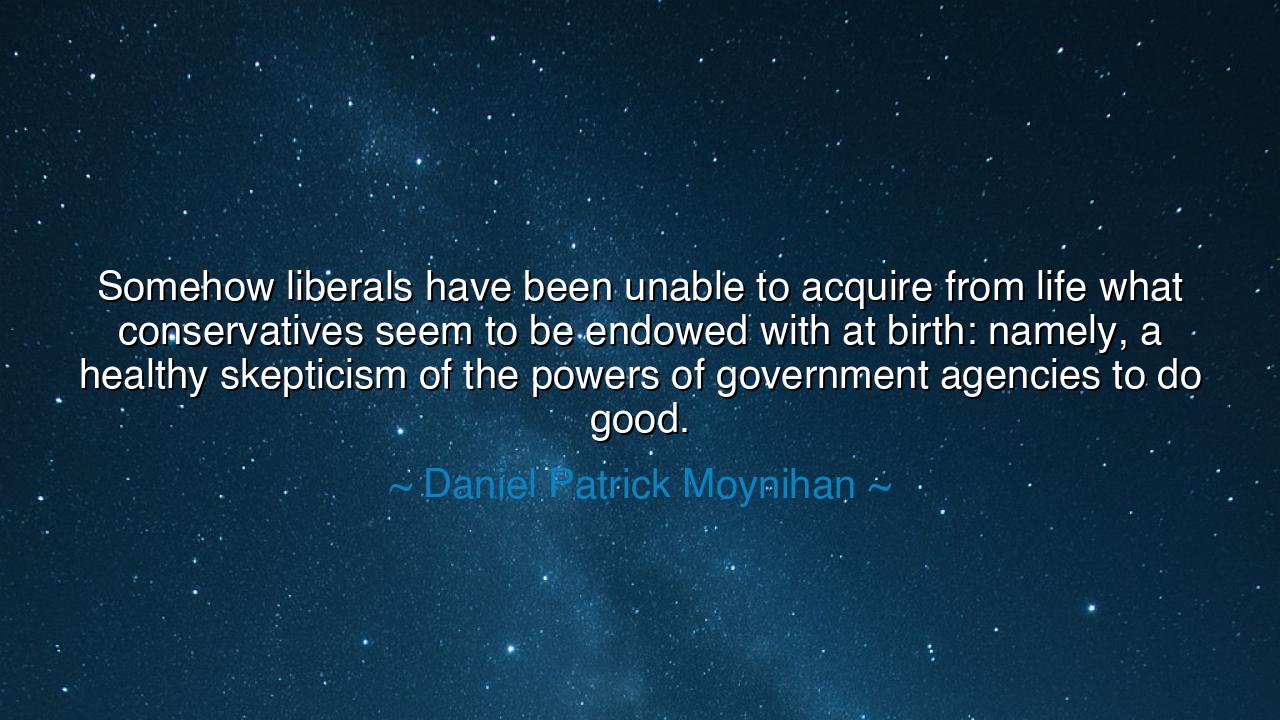
Somehow liberals have been unable to acquire from life what
Somehow liberals have been unable to acquire from life what conservatives seem to be endowed with at birth: namely, a healthy skepticism of the powers of government agencies to do good.






In the grand and restless theater of politics, where ideals rise like suns and fall like fading stars, Daniel Patrick Moynihan — scholar, diplomat, and statesman — spoke with the gravity of one who had seen both the beauty and the folly of power. He said: “Somehow liberals have been unable to acquire from life what conservatives seem to be endowed with at birth: namely, a healthy skepticism of the powers of government agencies to do good.” These words, though wrapped in political attire, are not mere commentary on partisanship; they are a timeless meditation on human nature, on the balance between hope and prudence, between the dream of reform and the discipline of restraint.
Moynihan was no mere cynic, nor was he an enemy of progress. He was a man of intellect and compassion, who served in the administrations of both Democrats and Republicans. He saw firsthand the machinery of government, with all its ambitions and inefficiencies. His words were born not from disdain, but from experience — from watching noble programs, crafted with the intent to heal, stumble beneath the weight of bureaucracy and unintended consequence. He had learned the hard truth that good intentions are not the same as good results, and that the power to do good through force can, when unchecked, do far greater harm.
The origin of this wisdom lies deep in the story of civilization itself. From the empires of antiquity to the republics of the modern age, rulers and reformers alike have believed they could perfect society through the decree of law or the reach of administration. Yet again and again, they found that human institutions are fallible, and that power, once centralized, tends to serve itself. Moynihan’s skepticism was not a denial of the need for governance, but a recognition of its limits. He sought to remind the hopeful that governments, like men, must be kept humble — for even when acting in righteousness, they may overreach, and in the name of doing good, extinguish the very liberty they aim to protect.
Consider the tale of the Soviet Union, born from a vision of equality and justice. Its founders promised to abolish poverty, to elevate the worker, to create heaven on earth through the will of the state. Yet the more the government agencies reached to do good, the more they crushed the spirit of the people they sought to save. Bureaucracy replaced compassion, control replaced conscience, and the dream became a prison. The lesson was clear to Moynihan and to all who had eyes to see: when the power to do good becomes absolute, it becomes the power to destroy. For as history teaches, the road to tyranny is often paved with the stones of benevolent intention.
And yet, Moynihan’s words do not mock the liberal heart. He does not scorn compassion, nor the desire to mend what is broken in the world. He merely warns that compassion, untempered by skepticism, becomes naive. The conservative, he observes, is born with an instinctive caution — a sense that power, even wielded by angels, must be restrained. The liberal, moved by empathy, believes that the right hands can make government a force of redemption. But Moynihan, who stood between both worlds, saw the truth that both must learn: that power must be watched, questioned, and balanced, or else it will grow beyond all human control.
Throughout his career, Moynihan served in positions where ideals met reality — from shaping social policy to representing the United States at the United Nations. He witnessed how programs meant to lift communities out of poverty sometimes trapped them in dependence, how well-meaning reforms gave birth to new forms of injustice. His skepticism was not the bitterness of disillusionment, but the maturity of understanding. He believed that reform must proceed with humility, and that those who govern must remember they are servants, not saviors. “To do good,” he might have said, “is not enough; one must also know the limits of what good can be done.”
The lesson, then, is one of balance — the sacred equilibrium between heart and mind, between compassion and caution. Let the liberal heart feel deeply, but let the conservative mind guard against excess. Let every citizen, whatever their creed, remember that government is a tool, not a god; a servant, not a master. When power claims to heal all wounds, it risks inflicting greater ones. True wisdom lies in the harmony of purpose and prudence — to strive for justice, but to do so with open eyes, knowing that even noble power must bow before the imperfect nature of man.
So, my child of the republic, heed Moynihan’s counsel as one might heed an elder’s warning spoken by the hearthfire. Love your nation, but do not worship its government. Believe in progress, but walk with caution. Demand justice, but question every authority that claims to bring it by decree. For the world is not perfected by power, but by conscience — and when power forgets its limits, conscience must remind it that even the mightiest government remains, forever and always, a fragile creation of the flawed yet striving human heart.






AAdministratorAdministrator
Welcome, honored guests. Please leave a comment, we will respond soon